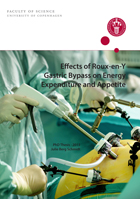PhD defence: Effects of Roux-en-Y Gastric Bypass on Energy Expenditure and Appetite
Julie Berg Schmidt
PhD thesis
Following a weight loss, mechanisms designed to protect body weight are activated, involving both an increase in appetite and a decrease in energy expenditure (EE). Such compensatory responses may predispose individuals to a lesser degree of weight loss and to weight regain. It has been proposed that gastric bypass (GBP) surgery attenuates these processes, explaining the superiority of this weight loss intervention. However, the effect of GBP on EE has never been investigated independently of acute changes in energy balance. After GBP, decreased motivation to eat coincides with hormonal changes, but how these hormones, separately and in combination, explain the substantial effects on appetite, energy intake, and, potentially, EE is poorly understood.
This thesis aimed to examine whether GBP can attenuate the decrease in EE normally associated with negative energy balance, as well as the roles of the hormones and signaling molecules peptide YY (PYY), leptin, fibroblast growth factor 19 (FGF19), and bile acids in these alterations. This was investigated in a clinical study with subjects randomized to either GBP or to a ‘pair-fed’ control group and was supported by a critical review of the existing literature. In the same study, it was explored how PYY, glucagon-like peptide-1 (GLP-1), cholecystokinin (CCK), leptin, and ghrelin contribute to postsurgical alterations in appetite. The possibility of GLP-1 and PYY exerting overlapping, additive, or even synergistic effects on energy intake and appetite was examined in a randomized, double-blinded, placebo-controlled, four-arm crossover study, wherein subjects received either mono- or coinfusion of GLP-1 and PYY.
Findings from the clinical studies do not support the preservation or increase of EE as a plausible explanation for the pronounced weight loss seen acutely after GBP, nor does the existing literature provide evidence for such roles. On the contrary, basal metabolic rate and total EE were suppressed more in GBP patients compared to pair-fed control subjects. This suppressive effect was associated with an additional decrease in leptin. Despite an exaggerated postprandial response of PYY, bile acids, and FGF19, no stimulating effect of GBP was found on meal-induced thermogenesis, nor did mono- or coinfusion of GLP-1 and PYY affect EE. However, it remains to be determined whether RYGB affects EE after energy balance is restored, and whether it particularly affects meal-induced thermogenesis merits further investigation. In spite of progressive weight loss, GBP decreased motivation to eat. This effect was partly explained by a simultaneous postprandial increase in GLP-1, a suppression of ghrelin, an increase in nausea, and to a lesser extent, an increase in PYY. Leptin and CCK, however, were not involved in reductions in motivation to eat after GBP. When GLP-1 and PYY were coinfused, the reduction in energy intake clearly exceeded the summed effects of the hormones when given separately. This suggests a synergistic effect, which has not previously been demonstrated in human studies.
In summary, GBP-induced stimulation of EE is unlikely to explain the larger weight loss after this procedure compared to other weight loss strategies. Rather, a reduction in motivation to eat, mediated at least partly by GLP-1, PYY, and ghrelin, as their complex interactions, seems to be a major contributor to early postoperative weight loss.
2013, 145 pages,
ISBN 978 87 7611 634 7
Time
12 September 2013 at 11:00
Venue
Auditorium A1-01.01 (Festauditoriet), Bülowsvej 17, 1870 Frederiksberg.
Opponents
Associate Professor Thomas Thyman, (Chair), Department of Nutrition, Exercise and Sports, Faculty of Science, University of Copenhagen, Denmark.
Professor Carel le Roux, Conway Institute, University College Dublin, Belfield, Dublin, Ireland.
Professor Erik Næslund, Karolinska Institute, Kirurgmottagningen, Danderyds sjukhus, Stockholm, Sweden.
Supervisors
Associated Professor Anders Sjödin, Department of Nutrition, Exercise and Sports, Faculty of Science, University of Copenhagen, Denmark.
Nikolaj Ture Gregersen, Novo Nordisk A/S, Denmark.
Susie Pedersen, C-ENDO Endocrinology Clinic, Calgary, AB, Canada.

